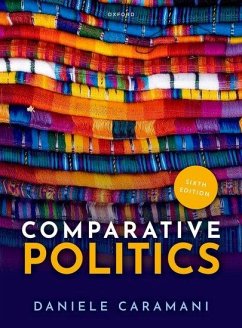Comparative Politics
Herausgeber: Caramani, Daniele
Comparative Politics
Herausgeber: Caramani, Daniele
- Broschiertes Buch
- Merkliste
- Auf die Merkliste
- Bewerten Bewerten
- Teilen
- Produkt teilen
- Produkterinnerung
- Produkterinnerung
With unparalleled empirical material, this is the most comprehensive introduction to comparative politics written by leading experts in the field.
Andere Kunden interessierten sich auch für
![In the Long Run In the Long Run]() Jonathan WhiteIn the Long Run10,44 €
Jonathan WhiteIn the Long Run10,44 €![What Is Populism? What Is Populism?]() Jan-Werner MullerWhat Is Populism?9,99 €
Jan-Werner MullerWhat Is Populism?9,99 €![In the Long Run In the Long Run]() Jonathan WhiteIn the Long Run15,99 €
Jonathan WhiteIn the Long Run15,99 €![The Narrow Corridor The Narrow Corridor]() Daron AcemogluThe Narrow Corridor23,99 €
Daron AcemogluThe Narrow Corridor23,99 €![The Politics Book The Politics Book]() DKThe Politics Book17,99 €
DKThe Politics Book17,99 €![European Union Politics European Union Politics]() European Union Politics40,99 €
European Union Politics40,99 €![Why Politics Fails Why Politics Fails]() Ben AnsellWhy Politics Fails9,99 €
Ben AnsellWhy Politics Fails9,99 €-
-
-
With unparalleled empirical material, this is the most comprehensive introduction to comparative politics written by leading experts in the field.
Hinweis: Dieser Artikel kann nur an eine deutsche Lieferadresse ausgeliefert werden.
Hinweis: Dieser Artikel kann nur an eine deutsche Lieferadresse ausgeliefert werden.
Produktdetails
- Produktdetails
- Verlag: Oxford University Press
- 6 Revised edition
- Seitenzahl: 624
- Erscheinungstermin: Mai 2023
- Englisch
- Abmessung: 266mm x 195mm x 26mm
- Gewicht: 1326g
- ISBN-13: 9780192846051
- ISBN-10: 0192846051
- Artikelnr.: 64636960
- Herstellerkennzeichnung
- Libri GmbH
- Europaallee 1
- 36244 Bad Hersfeld
- gpsr@libri.de
- Verlag: Oxford University Press
- 6 Revised edition
- Seitenzahl: 624
- Erscheinungstermin: Mai 2023
- Englisch
- Abmessung: 266mm x 195mm x 26mm
- Gewicht: 1326g
- ISBN-13: 9780192846051
- ISBN-10: 0192846051
- Artikelnr.: 64636960
- Herstellerkennzeichnung
- Libri GmbH
- Europaallee 1
- 36244 Bad Hersfeld
- gpsr@libri.de
Daniele Caramani is Professor of Comparative Politics at the University of Zurich. He is the author of The Nationalization of Politics (Cambridge University Press 2004)-awarded the Stein Rokkan Prize for Comparative Research in the Social Sciences-and The Europeanization of Politics (Cambridge University Press 2015) as well as of Introduction to the Comparative Method with Boolean Algebra (Sage, 'Quantitative Applications in the Social Sciences' 2009) and the handbook and CD-ROM Elections in Western Europe since 1815 (Palgrave 2000). He is co-director of the Constituency-Level Data Archive (CLEA) which received the APSA 'Dataset Award'.
* 0: Daniele Caramani: Introduction to Comparative Politics
* Section I: Theories and Methods
* 1: Bo Rothstein: The Relevance of Comparative Politics
* 2: B. Guy Peters: Approaches in Comparative Politic
* 3: Paul Pennings: Comparative Research Methods
* Section II: The Historical Context
* 4: Atsuko Ichijo: The Nation-State and Multicultural Citizenship
* 5: Aníbal Pérez-Liñán: Democracies
* 6: Natasha Lindstaedt: Authoritarian Regimes
* Section III: Structures and Institutions
* 7: Amie Kreppel: Legislatures
* 8: Wolfgang C Müller: Governments and Cabinets
* 9: Alec Stone Sweet: Constitutions, Rights, and Judicial Power
* 10: Nicole Curato: Democratic Innovations
* 11: Orit Kedar: Elections and Representation
* 12: iesbet Hooghe, Gary Marks, and Arjan H. Schakel: Multilevel
Governance
* Section IV: Actors and Processes
* 13: Richard S. Katz: Political Parties
* 14: Daniele Caramani: Party Systems
* 15: Roland Erne: Interest Groups
* 16: Dieter Rucht: Social Movements
* 17: Christian Welzel and Ronald Inglehart: Political Culture
* 18: Herbert Kitschelt and Philipp Rehm: Political Participation
* 19: Frank Esser and Barbara Pfetsch: Political Communication
* Section V: Public Policies
* 20: Christoph Knill and Jale Tosun: Policy Making
* 21: Kees van Kersbergen and Philip Manow: The Welfare State
* 22: Jane Gingrich: The Impact of Public Policies
* Section VI: Beyond the Nation-State
* 23: Simon Hix: The EU as a New Political System
* 24: Georg Sørensen: Globalization and the Nation-State
* 25: Julia Leininger and Solveig Richter: Promoting and Protecting
Democracy
* Section I: Theories and Methods
* 1: Bo Rothstein: The Relevance of Comparative Politics
* 2: B. Guy Peters: Approaches in Comparative Politic
* 3: Paul Pennings: Comparative Research Methods
* Section II: The Historical Context
* 4: Atsuko Ichijo: The Nation-State and Multicultural Citizenship
* 5: Aníbal Pérez-Liñán: Democracies
* 6: Natasha Lindstaedt: Authoritarian Regimes
* Section III: Structures and Institutions
* 7: Amie Kreppel: Legislatures
* 8: Wolfgang C Müller: Governments and Cabinets
* 9: Alec Stone Sweet: Constitutions, Rights, and Judicial Power
* 10: Nicole Curato: Democratic Innovations
* 11: Orit Kedar: Elections and Representation
* 12: iesbet Hooghe, Gary Marks, and Arjan H. Schakel: Multilevel
Governance
* Section IV: Actors and Processes
* 13: Richard S. Katz: Political Parties
* 14: Daniele Caramani: Party Systems
* 15: Roland Erne: Interest Groups
* 16: Dieter Rucht: Social Movements
* 17: Christian Welzel and Ronald Inglehart: Political Culture
* 18: Herbert Kitschelt and Philipp Rehm: Political Participation
* 19: Frank Esser and Barbara Pfetsch: Political Communication
* Section V: Public Policies
* 20: Christoph Knill and Jale Tosun: Policy Making
* 21: Kees van Kersbergen and Philip Manow: The Welfare State
* 22: Jane Gingrich: The Impact of Public Policies
* Section VI: Beyond the Nation-State
* 23: Simon Hix: The EU as a New Political System
* 24: Georg Sørensen: Globalization and the Nation-State
* 25: Julia Leininger and Solveig Richter: Promoting and Protecting
Democracy
* 0: Daniele Caramani: Introduction to Comparative Politics
* Section I: Theories and Methods
* 1: Bo Rothstein: The Relevance of Comparative Politics
* 2: B. Guy Peters: Approaches in Comparative Politic
* 3: Paul Pennings: Comparative Research Methods
* Section II: The Historical Context
* 4: Atsuko Ichijo: The Nation-State and Multicultural Citizenship
* 5: Aníbal Pérez-Liñán: Democracies
* 6: Natasha Lindstaedt: Authoritarian Regimes
* Section III: Structures and Institutions
* 7: Amie Kreppel: Legislatures
* 8: Wolfgang C Müller: Governments and Cabinets
* 9: Alec Stone Sweet: Constitutions, Rights, and Judicial Power
* 10: Nicole Curato: Democratic Innovations
* 11: Orit Kedar: Elections and Representation
* 12: iesbet Hooghe, Gary Marks, and Arjan H. Schakel: Multilevel
Governance
* Section IV: Actors and Processes
* 13: Richard S. Katz: Political Parties
* 14: Daniele Caramani: Party Systems
* 15: Roland Erne: Interest Groups
* 16: Dieter Rucht: Social Movements
* 17: Christian Welzel and Ronald Inglehart: Political Culture
* 18: Herbert Kitschelt and Philipp Rehm: Political Participation
* 19: Frank Esser and Barbara Pfetsch: Political Communication
* Section V: Public Policies
* 20: Christoph Knill and Jale Tosun: Policy Making
* 21: Kees van Kersbergen and Philip Manow: The Welfare State
* 22: Jane Gingrich: The Impact of Public Policies
* Section VI: Beyond the Nation-State
* 23: Simon Hix: The EU as a New Political System
* 24: Georg Sørensen: Globalization and the Nation-State
* 25: Julia Leininger and Solveig Richter: Promoting and Protecting
Democracy
* Section I: Theories and Methods
* 1: Bo Rothstein: The Relevance of Comparative Politics
* 2: B. Guy Peters: Approaches in Comparative Politic
* 3: Paul Pennings: Comparative Research Methods
* Section II: The Historical Context
* 4: Atsuko Ichijo: The Nation-State and Multicultural Citizenship
* 5: Aníbal Pérez-Liñán: Democracies
* 6: Natasha Lindstaedt: Authoritarian Regimes
* Section III: Structures and Institutions
* 7: Amie Kreppel: Legislatures
* 8: Wolfgang C Müller: Governments and Cabinets
* 9: Alec Stone Sweet: Constitutions, Rights, and Judicial Power
* 10: Nicole Curato: Democratic Innovations
* 11: Orit Kedar: Elections and Representation
* 12: iesbet Hooghe, Gary Marks, and Arjan H. Schakel: Multilevel
Governance
* Section IV: Actors and Processes
* 13: Richard S. Katz: Political Parties
* 14: Daniele Caramani: Party Systems
* 15: Roland Erne: Interest Groups
* 16: Dieter Rucht: Social Movements
* 17: Christian Welzel and Ronald Inglehart: Political Culture
* 18: Herbert Kitschelt and Philipp Rehm: Political Participation
* 19: Frank Esser and Barbara Pfetsch: Political Communication
* Section V: Public Policies
* 20: Christoph Knill and Jale Tosun: Policy Making
* 21: Kees van Kersbergen and Philip Manow: The Welfare State
* 22: Jane Gingrich: The Impact of Public Policies
* Section VI: Beyond the Nation-State
* 23: Simon Hix: The EU as a New Political System
* 24: Georg Sørensen: Globalization and the Nation-State
* 25: Julia Leininger and Solveig Richter: Promoting and Protecting
Democracy








